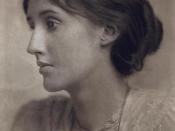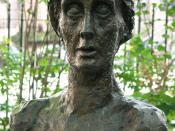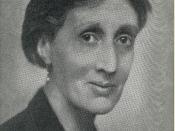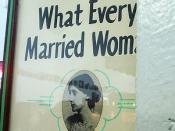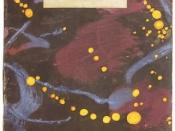Oakland, John. "Woolf's Kew Gardens." English Studies 68.3 (1987): 264-274 In the article "Virginia Woolf's Kew Gardens" Oakland is trying to examine a short story that few people took the time to do. He says, "It is not an expression of meaningless life but, on the contrary, reveals a harmonious, organic optimism." (1) Since she chose to make it such a short piece of work, it fits perfectly with her style of writing. She doesn't make the theme the subject matter, but instead, reveals it through the organization of the piece. As the characters react to stimuli, this helps reveal a unified meaning. She bases her fiction off of the characters emotional feelings. By doing this she gives the reader a sense of experience and further deepens the organization and brings out the theme even more. Oakland goes on to say "Kew Gardens is structured to present a series of points of view, authorial comments and descriptions, progressing from one experience to another by interlocking devices of association."
(3) Woolf is the third person narrator, and the story focuses on the natural background. All of the non-human creatures become characters because she so deeply describes them. In the final paragraph of the short story all of the entities come together as one. "The Chinese Box demonstrates precisely the main theme of Kew Gardens by showing the interconnection of objects, or a complex of boxes within boxes, the opening of which are presumably infinite." (10); meaning that nature relies on humans, and humans rely on nature.
I find that this author uses Ethos a lot because he is always quoting someone else and giving direct quotes from the short story. He says "Woolf herself, writing to Vanessa Bell in 1918 of the unpublished work, called it 'a case of atmosphere' and wondered if she had 'got it right'. (1) This isn't the only quote of Woolf's he uses either. He directly quotes her at least three other times. I think he does this to try and get the reader to believe that all of his opinions are true because he is using her exact words and has plenty of other important sources to back it up.
Although I do not know much about this short story, or English for that matter, it seems as if Oakland provided me with enough supported information to convince me that his views on the article are correct. His use of ethos is what pushed me over the top. I like to see hard evidence when forming opinions and he provided me with enough. The ease in which he described the main points of the short story is wonderful. I think that this is a very well thought out review of this short story, and it deepens my understanding of the reading.

